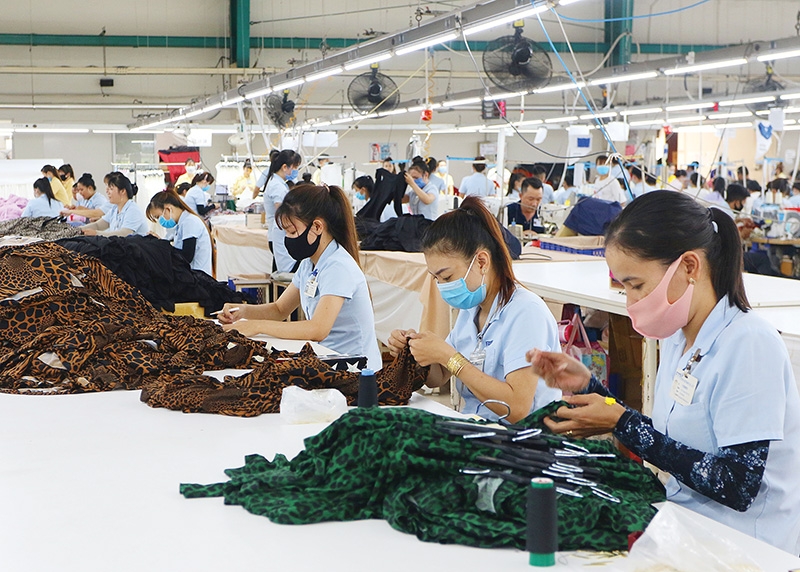Resolutions accessible via EVIPA rules
 |
| If companies have better access to conflict resolution procedures, they are likely to invest more, Photo: Le Toan |
The Vietnamese National Assembly last week adopted the EU-Vietnam Investment Protection Agreement (EVIPA), which will however need to be ratified by all EU member states according to their respective national procedures before it can fully enter into force. Once taking effect, the deal, adopted by the European Parliament on February 12, will replace the bilateral investment agreements that 21 EU member states currently have in place with Vietnam.
The EVIPA aims to protect investors and investments in the EU and Vietnam and ensures they will be given fair treatment. Financiers from both sides will have their disputes assessed by a special international dispute resolution mechanism.
The EVIPA embraces a permanent dispute resolution system. Specifically, in disagreements regarding investment (for example, expropriation without compensation or discrimination of investment), an investor is allowed to bring the issue to the investment tribunal for settlement.
To ensure the fairness and independence of the dispute settlement, a permanent tribunal will comprise nine members, with three nationals each appointed from the EU and Vietnam, together with three nationals from third countries. Cases will be heard by a three-member tribunal selected by the chairman of the tribunal.
“This is also to ensure consistent rulings in similar cases, thus making the dispute settlement more predictable,” noted the EuroCham Whitebook 2019 on trade and investment issues for European businesses in Vietnam.
The EVIPA also allows a sole tribunal member where the claimant is a small- or medium-sized enterprise or the compensation of damaged claims is relatively low. This is a flexible approach considering that Vietnam is still a developing country. In case either of the disputing parties disagrees with the decision of the tribunal, it can appeal it to the appeal tribunal.
“While this is different from the common arbitration proceeding, it is quite similar to the two-level dispute settlement mechanism in the World Trade Organization (panel and appellate body). We believe that this mechanism could save time and cost for the whole proceedings,” the whitebook stated.
The final settlement is binding and enforceable from the local courts regarding its validity, except for a five-year period following the entry into force of the FTA for Vietnam.
According to a German company crafting paper products in a province nearby Hanoi, if this international dispute resolution mechanism takes effect under the EVIPA, its year-long dispute with four Vietnamese partners will likely be solved.
“If the dispute is solved, we may invest more in our factory,” a company representative told VIR. “We have invested only over $3 million so far.”
The company was established in 2008 by Vietnamese people. During its operation, it imported machinery and equipment from a German company, which later on became its stakeholder. However, after the stake purchase agreement was inked, with the new joint venture established in 2010, the German company’s chairman discovered that the Vietnamese partners had made no stake contributions for the joint venture, and without legal documents. Under the Law on Enterprises 2014, all stakeholders shall have to introduce all necessary documents about stake purchase within a maximum 90 days after the enterprise is established. The company wanted to change its business registration certificate but failed as the Vietnamese stakeholders’ specific capital contributions were not specified, and therefore the names of the Vietnamese stakeholders cannot be removed on the certificate.
“We hope the case may be solved thanks to the EVIPA,” the representative said. “If this case cannot help us, we will have to stop operation in Vietnam.”
What the stars mean:
★ Poor ★ ★ Promising ★★★ Good ★★★★ Very good ★★★★★ Exceptional
 Tag:
Tag:
Themes: EVFTA & EVIPA
Related Contents
Latest News
More News
- NAB Innovation Centre underscores Vietnam’s appeal for tech investment (January 30, 2026 | 11:16)
- Vietnam moves towards market-based fuel management with E10 rollout (January 30, 2026 | 11:10)
- Vietnam startup funding enters a period of capital reset (January 30, 2026 | 11:06)
- Vietnam strengthens public debt management with World Bank and IMF (January 30, 2026 | 11:00)
- PM inspects APEC 2027 project progress in An Giang province (January 29, 2026 | 09:00)
- Vietnam among the world’s top 15 trading nations (January 28, 2026 | 17:12)
- Vietnam accelerates preparations for arbitration centre linked to new financial hub (January 28, 2026 | 17:09)
- Vietnam's IPO market on recovery trajectory (January 28, 2026 | 17:04)
- Digital economy takes centre stage in Vietnam’s new growth model (January 28, 2026 | 11:43)
- EU Council president to visit Vietnam amid partnership upgrade (January 28, 2026 | 11:00)





















 Mobile Version
Mobile Version